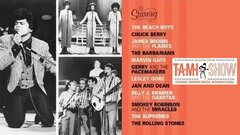Florence Ballard

Singer
Birth Date: June 30, 1943
Death Date: February 22, 1976 — 32 years old
Birth Place: Detroit, Michigan
Bands: The Supremes
As a founding member of The Supremes, Florence Ballard's rise to fame, along with her abrupt dismissal from the group and early death, was one of the great tragedies of American pop music. Possessed of a formidable voice and stage presence, she brought together the group as a teenager in her native Detroit, but after signing with Motown Records, she was quickly relegated to what essentially amounted to backing vocalist behind Diana Ross.
The situation, combined with other personal issues, crushed Ballard's spirit, and she was fired from the group at the height of their popularity in the late 1960s. She descended into poverty and substance abuse for much of the early 1970s before mounting a brief comeback in 1975, but her weakened health caused a fatal heart attack in 1976. Her story would later inspire the character of Effie White, the multi-talented songstress relegated to backup singer, in the hit Broadway production and later feature film, "Dreamgirls." With Ballard's sad death, fans mourned a premature close a life spent in pursuit of song but never fully allowed to blossom in the spotlight.
Born in Detroit, MI on June 30, 1943, Florence Glenda Ballard was the ninth of 15 children by Jessie Lambert Ballard and Lurlee Wilson, who had relocated from Mississippi to find work in the then-booming automotive industry. Ballard's father, an amateur musician, introduced his daughter to performing by teaching her various songs and accompanying her on guitar. She soon began singing at her local church and in school music classes, all the while earning favorable reviews for her voice throughout the Brewster-Douglass housing projects, where she lived with her family.
Two neighbors in the projects, Eddie Kendricks and Paul Williams, set her on the path to stardom. They were members of a male vocal group called the Primes - which later became the Temptations - and after hearing Ballard sing, introduced her to their manager, Milton Jenkins, who was looking for girls in order to a form the Primettes, a sister act to the Primes.
After hiring Ballard, Jenkins asked her to recruit the rest of the group's members from her friends and schoolmates. She soon contacted Mary Wilson, whom she had competed with at a local talent competition. Ballard's neighbor, Diane Earle, who later billed herself as Diana Ross, and Paul Williams' girlfriend, Betty McGlown, soon filled the Primettes' ranks. The newfound group soon began performing frequently on the dance party and talent show circuit throughout 1959.
The following year, they recorded a single, "Tears of Sorrow"/"Pretty Baby" for the micro-label Lupine Records shortly before McGlown was replaced by Barbara Martin. The single failed to make an impact with listeners, but Ross' friendship with singer Smokey Robinson granted them an audition with Motown Records.
Label chief Berry Gordy, Jr., was impressed with the teenagers' singing, especially the interplay between Ballard's powerful vocals with Wilson's lower register and Ross's soprano. But he refused to sign them until they completed high school, so the quartet bided their time by recording backing vocals for other Lupine artists, as well as the occasional Motown tune while maintaining their busy schedule of parties and sock hops.
It was after one such event in 1960 that Ballard accepted a ride home from a high school student, Reginald Harding. She was taken to an empty lot where Harding raped her at knifepoint. The incident had a profoundly traumatic effect on the confident Ballard, who grew withdrawn and distrustful of others in the years that followed. Harding himself would follow a downward path that led to his shooting death at age 32 after a brief and tumultuous career in the NBA.
In 1961, the Primettes finally landed a contract with Motown. Renamed The Supremes, the group was quickly pared down to a trio with the departure of Barbara Martin, and Berry Gordy, Jr. began to refashion the group around the voice of Diana Ross. Prior to their signing with Motown, each of the members shared lead duty on songs. But Gordy felt that Wilson's low tones and Ballard's powerful voice - so strong that she was allegedly required to stand nearly 2- feet from the microphones in recording sessions - would not produce what the company defined as "The Sound of Young America," a charming euphemism for courting both black and white listeners in equal numbers.
By 1964, the year the Supremes waxed their breakout hit "Where Did Our Love Go?" the group's marching order had been completed refashioned, with Ross thrust into the role of lead vocalist and Wilson and Ballard largely relegated to backing vocals.
The regime change in The Supremes further traumatized an already shell-shocked Ballard, who was still reeling from the 1960 rape. Between 1964 and 1967, the Supremes racked up 10 No. 1 hits on the pop charts - including "Baby Love," "Stop! In the Name of Love" and "Come See About Me" - but few, if any, knew of Ballard's importance in the creation of the group. The outside world viewed the trio as Diana Ross's vehicle, a notion that was cemented in 1967 when Gordy changed the group's name to Diana Ross and the Supremes.
The move was the final straw for Ballard, who retreated into alcoholism and began missing performances and recording sessions. Cindy Birdsong of the Bluebelles (later Labelle) was hired as a temporary replacement before Gordy made it permanent in 1967.
Ballard attempted to go it alone as a solo artist, signing with ABC Records and releasing a pair of singles, "It Doesn't Matter How I Say It (It's What I Say That Matters)" and "Love Ain't Love," in 1968. Both failed miserably, as did the management headed by her husband, former Motown chauffeur Thomas Chapman, which wiped out a modest payment for back royalties received from Motown.
Ballard soldiered on, but despite a string of high-profile performances, including an inaugural ball for President Richard Nixon, her solo career slowly faded out of sight. By 1971, Chapman had abandoned her and their three children, and their house had been put up for foreclosure. She soon returned to the Detroit projects from which she had come, and subsided on welfare, which drew national attention from the press.
Ballard's fortunes appeared to change in 1975 with the receipt of a sizable insurance settlement, which allowed her to buy a home and overcome her mounting addictions to drugs and alcohol. She soon reunited with Chapman and began performing at Detroit-area venues. But on Feb. 21, 1976, Ballard was hospitalized after complaining of numbness in her extremities. She died from cardiac arrest the following day at the age of 32.
Ballard's life and career were eulogized in the Broadway musical "Dreamgirls," which drew inspiration for its plot about a black female singing group from the Supremes' history. The show's central character, Effie White, endured many of the same tribulations as Ballard, including struggles with her weight and a devastating dismissal from the group. Jennifer Hudson played Effie in the 2006 screen version of the musical, and dedicated her Oscar win for Best Supporting Actress to Ballard's memory. By Paul Gaita


